|
|
|
Sort Order |
|
|
|
Items / Page
|
|
|
|
|
|
|
| Srl | Item |
| 1 |
ID:
162337
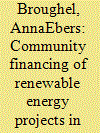

|
|
|
|
|
| Summary/Abstract |
Small-scale investors are gaining recognition as a valuable source of private funding necessary for a successful energy transition. Still, there is limited knowledge about the characteristics of potential investors, especially in community renewable energy projects. This study intends to address this gap and investigates the impact of socio-demographic and socio-psychological characteristics on individuals’ willingness to invest in community renewable energy projects. Our investigation is based on two large-scale representative surveys of 2260 respondents in Austria and Switzerland. The majority of respondents would be willing to invest 1000 to 10,000 CHF/EUR in such a project, with higher amounts in the Swiss sample. Potential investors in Austria tend to be male homeowners with higher incomes, while Swiss investors are more educated. Generally, positive attitudes and beliefs related to renewable energy have a significant impact on investment intention. The largest group of potential investors in both countries can be described as ‘urban wind energy enthusiasts’, who show high acceptance of wind energy installations near their communities. Surprisingly, a significant segment of potential investors is skeptical of a nearby wind installation. Study results can be used by decision-makers to tailor appropriate policy measures and by project developers for communication of the project aims and benefits.
|
|
|
|
|
|
|
|
|
|
|
|
|
|
|
|
| 2 |
ID:
162342
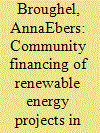

|
|
|
|
|
| Summary/Abstract |
Small-scale investors are gaining recognition as a valuable source of private funding necessary for a successful energy transition. Still, there is limited knowledge about the characteristics of potential investors, especially in community renewable energy projects. This study intends to address this gap and investigates the impact of socio-demographic and socio-psychological characteristics on individuals’ willingness to invest in community renewable energy projects. Our investigation is based on two large-scale representative surveys of 2260 respondents in Austria and Switzerland. The majority of respondents would be willing to invest 1000 to 10,000 CHF/EUR in such a project, with higher amounts in the Swiss sample. Potential investors in Austria tend to be male homeowners with higher incomes, while Swiss investors are more educated. Generally, positive attitudes and beliefs related to renewable energy have a significant impact on investment intention. The largest group of potential investors in both countries can be described as ‘urban wind energy enthusiasts’, who show high acceptance of wind energy installations near their communities. Surprisingly, a significant segment of potential investors is skeptical of a nearby wind installation. Study results can be used by decision-makers to tailor appropriate policy measures and by project developers for communication of the project aims and benefits.
|
|
|
|
|
|
|
|
|
|
|
|
|
|
|
|
| 3 |
ID:
110709


|
|
|
|
|
| Publication |
2011.
|
| Summary/Abstract |
With a heightened focus on the concept of sustainability in the past few decades, government, business and individuals have become increasingly aware of the need to reduce our environmental footprint. Consequently there has been much research on consumer environmental behaviour, and the beliefs, norms and attitudes that influence this behaviour. In this article we develop a conceptual framework of consumer environmental behaviour and its antecedents, and test hypotheses within the framework by means of a survey of green consumers. The results show that general environmental beliefs do influence norms on environmental actions and prices, but only norms on price are correlated with environmental attitudes; both intrinsic and extrinsic environmental drivers together with social norms and community influence are associated with environmental attitudes, but cost barriers may have a negative influence. It was also found that there was a strong association between environmental attitudes and energy saving behaviours but the latter was not in any way influenced by government policies or subsidies.
|
|
|
|
|
|
|
|
|
|
|
|
|
|
|
|
| 4 |
ID:
172423


|
|
|
|
|
| Summary/Abstract |
Ideational variables have frequently been employed in positivist-minded and materialist analyses of state behaviour. Almost inevitably, because of these commitments, such studies run into theoretical challenges relating to the use of ideas. In this article, I suggest that integrating ideational factors in positivist and materialist approaches to state behaviour requires: (1) distinguishing conceptually between interests and ideation as well as between individual beliefs and social ideas; and (2) addressing challenges of operationalisation and measurability. To that end, I employ neoclassical realism as a case study. I argue that a re-conceptualisation of ideas as externalised individual beliefs employed in political deliberation allows neoclassical realists to focus on how ideas and ideational competition intervene in the transmission belt from materially given interests to foreign policy choice. At the same time, it more clearly operationalises ideas as identifiable in language and communication. I suggest this reconceptualisation, while consistent with realist paradigmatic assumptions, need not be limited to neoclassical realism. Instead, transposed to different paradigms, it would similarly allow positivist-minded constructivists and institutionalists to avoid a conceptually and methodologically awkward equation of different ideational factors.
|
|
|
|
|
|
|
|
|
|
|
|
|
|
|
|
| 5 |
ID:
088992
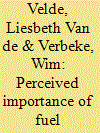

|
|
|
|
|
| Publication |
2009.
|
| Summary/Abstract |
Consumer consciousness concerning the environment has increased and become a major factor in purchasing behaviour. Consumer research to understand and influence the adoption of green technologies and products is therefore important. This paper investigates the beliefs of Belgian consumers concerning the use of biofuels and identifies four consumer segments based on the perceived importance of different fuel characteristics. To convince the performance-oriented consumers to use biofuels, information about these fuels has to stress their quality and performance standards. The society-oriented cluster attaches great importance to environmental friendliness, odour, production origin, the opportunity to decrease energy dependency and job creation. To persuade the environment-oriented consumers low odour, beneficial environmental influence and quality assurance of biofuels have to be emphasized. The convenience-oriented consumers will be the most difficult to persuade to use biofuels. They need to be convinced that every vehicle can drive with biofuel blends without the need for engine modifications. Concerns relating to the price and perceived low availability of biofuels at fuel stations are major obstacles for all consumers involved in this study.
|
|
|
|
|
|
|
|
|
|
|
|
|
|
|
|
| 6 |
ID:
131854
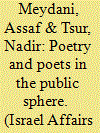

|
|
|
|
|
| Publication |
2014.
|
| Summary/Abstract |
Political poetry is not tested by its impact and the number of its readers but in its very participation in the public discourse on the issues of the day. Poetry moves between forces that focus the attention of its audience inwards, to the lyrics of the poems, and the forces that connect to the social, cultural, and political climate in which the poems are published. These movements reflect the power of poetry, which, using language, breaks the barriers that exist between people - individuals or groups, as well as between these individuals or groups and reality. This way, the poet serves as the element that formulates the informal cultural feelings in society and offers an interpretive package of the existing reality, as well as the alternative reality. Poets place their 'truth' within the perception of reality, and this truth can compete in the public arena with the 'truth' that is portrayed by politicians.
|
|
|
|
|
|
|
|
|
|
|
|
|
|
|
|
| 7 |
ID:
103908


|
|
|
|
|
| Publication |
2011.
|
| Summary/Abstract |
We use results from a household survey to explore the relation between religiosity and our proxy for income among herders in rural Tibet. Our main results are twofold. First, there exists a positive relation between the intensity of religious beliefs (the main 'output' of the religious production process) and income - beliefs about the afterlife affect production and savings decisions today. Second, and perhaps more surprising, we find an inverted U-shaped relation between religious 'inputs' (time and money spent in the temple) and income. While it is possible to use too much resources as religious inputs, we find that the great majority of the respondents is on the upward sloping part of the curve linking economic performance to religious inputs. We present tentative evidence that the positive impact of religiosity and income may be explained by status (reputation) and information effects associated with producing religiosity.
|
|
|
|
|
|
|
|
|
|
|
|
|
|
|
|
| 8 |
ID:
169935
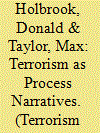

|
|
|
|
|
| Summary/Abstract |
Terrorism is a highly irregular form of crime where multiple factors combine to create circumstances that are unique to each case of involvement, or attempted involvement, in terrorist violence. Yet, there are commonalities in the way in which efforts to become involved unfold as processes, reflected as sequential developments where different forces combine to create conditions where individuals seek to plan acts of violence. The best way to frame this involvement is through analytical approaches that highlight these procedural dimensions but are equally sensitive to the nuances of each case. Analysing pre-arrest media usage of convicted terrorists, this paper focuses on the ways in which belief pathways and operational pathways interact in five distinct cases of terrorist involvement in the UK in what are termed “process narratives.”
|
|
|
|
|
|
|
|
|
|
|
|
|
|
|
|
| 9 |
ID:
127914


|
|
|
|
|
| Publication |
2014.
|
| Summary/Abstract |
While physical interventions such as external wall cladding can improve the energy efficiency of domestic properties, how residents think about and respond to such interventions can influence both their uptake and impact on the household's energy use. The present research investigated what residents living within deprived communities in Yorkshire and the Humber (United Kingdom) thought about a number of household energy efficiency interventions proposed as part of a project known as "The BIG Energy Upgrade". The Theory of Planned Behaviour was used as a framework for investigating residents' beliefs. Residents generally felt positive about the proposed interventions and expected that they would lead to financial savings, improve the appearance and warmth of their homes, and sense of pride in the local community. However, while residents intended to adopt energy efficiency interventions if offered them, they were less willing to personally invest in them. Home ownership and the belief in humans' ability to tackle climate change were found to predict willingness to invest. These findings help to understand responses to initiatives that seek to improve the energy efficiency of hard-to-treat homes.
|
|
|
|
|
|
|
|
|
|
|
|
|
|
|
|
| 10 |
ID:
148935
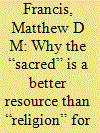

|
|
|
|
|
| Summary/Abstract |
The popular media and many in academia often overstate the role that religion, and its supposedly unique qualities, has played in recent acts of terror. In this article, I argue that the notion of religious violence is unhelpful and that there is a more useful concept that we can utilize to draw out the values and ideas that play a role in the move to violence in both religious and secular groups. From a series of case studies on religious and non-religious groups, I have drawn out an alternative framework for investigating and learning from the role that beliefs play in motivations and justifications for terrorism. This framework uses the concept of non-negotiable (or “sacred”) beliefs. It is as applicable to secular as it is to religious groups, and can show us much more about how such beliefs can contribute to violence.
|
|
|
|
|
|
|
|
|
|
|
|
|
|
|
|
|
|
|
|
|